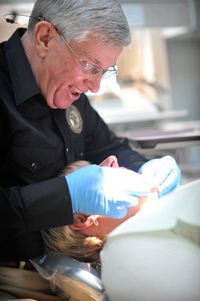
When tooth nerve roots become infected with bacteria, they often develop periapical abscesses, or pockets of pus. They can also form on the gums next to tooth roots and the gums themselves and are referred to as periodontal and gingival abscesses, respectively. Below, learn what causes these painful infections and how they are treated by family dental care professionals to prevent them from spreading to the jaw, head, and neck.
What to Know About Tooth Abscesses
Causes & Symptoms
Mouth injuries, such as cracked teeth, can cause abscesses to form if bacteria enter the pulp, which is the inner tooth material; it consists of nerves and blood vessels. Most abscesses are the result of insufficient oral hygiene, which lets bacteria build up in the mouth, causing cavities and gum disease. A badly decayed tooth, for example, allows bacteria to enter and infect the pulp. Gingivitis and gum disease cause gum tissue to swell and recede, leaving tooth roots vulnerable to infection.
 Other tooth abscess causes include severe tooth grinding, or bruxism, which wears away at the enamel, causing bacteria to enter the pulp. Injuries that cut off blood supply to the teeth also increase susceptibility.
Other tooth abscess causes include severe tooth grinding, or bruxism, which wears away at the enamel, causing bacteria to enter the pulp. Injuries that cut off blood supply to the teeth also increase susceptibility.
Abscess symptoms include throbbing toothaches, jaw pain, neck or ear pain, fever, chewing sensitivities, cheek swelling, temperature sensitivities, breathing and swallowing problems, and swollen and tender lymph nodes.
Treatment & Prevention
If you believe you have an abscessed tooth, see your dentist to treat the infection. A family dental care professional will determine the type of abscess you have and drain it by making a small incision. The area will then be cleaned with a saline solution to prevent re-infection. Also, you will likely receive an antibiotic prescription to further prevent infections and need other treatments, such as a root canal or tooth extraction.
The best way to prevent abscesses is with diligent oral hygiene. Brush your teeth gently for two minutes twice a day using a soft-bristled tooth, and floss once daily. Additionally, see your dentist every six months for teeth cleanings and checkups, and refrain from consuming an excessive amount of sugary foods and beverages. Mouth bacteria feed on sugar, forming acids and plaque.
Whether you have an abscess or need a teeth cleaning, contact Magnolia Dental. The family dental care professionals at this Waynesboro, VA, practice offer cosmetic and advanced treatments that keep area residents smiling. Call (540) 943-2723 today to schedule an appointment, or visit them online for more information. Get additional dental care tips on Facebook.
About the Business
Have a question? Ask the experts!
Send your question

